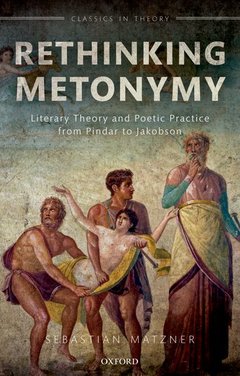Description
Rethinking Metonymy
Literary Theory and Poetic Practice from Pindar to Jakobson
Classics in Theory Series
Author: Matzner Sebastian
Language: English
Subject for Rethinking Metonymy:
Rethinking Metonymy
Publication date: 09-2019
336 p. · 13.9x21.6 cm · Paperback
Out of Print
Publication date: 09-2019
336 p. · 13.9x21.6 cm · Paperback
Out of Print
Rethinking Metonymy
Publication date: 09-2016
322 p. · 14.2x22.3 cm · Hardback
Out of Print
Publication date: 09-2016
322 p. · 14.2x22.3 cm · Hardback
Out of Print
Description
/li>Biography
/li>
Although metonymy has long been recognized as being a central device in poetic language, it has received little critical attention in its own right. Not only has this created a gap in literary analytical scholarship which needs to be addressed, but it has also allowed for problematic appropriations of metonymy as a critical concept now widely in use in structuralist studies across the humanities. Rethinking Metonymy is the first monograph to confront and resolve these issues. It advances the theory of poetic language by developing a ground-breaking new definition of metonymy on the basis of an evaluation of examples in Greek tragedy and lyric poetry, considering these in conjunction with examples from classicizing and Romantic German poetry for the purposes of illustration and comparison, including works by Goethe, Schiller, and Hölderlin. In addition to establishing the fundamental principle, different conformations, and aesthetic effects of this important poetic device, the volume also demonstrates how the new arguments it offers have the potential to set an agenda for far-reaching reconsiderations in literary studies and beyond. It mobilizes analytical insights into the inner workings of metonymy by examining three case studies designed to explore the trope in critical practice, covering its role in creating a 'hellenizing' style, what happens to it in 'classic' German translations of Aeschylus' Agamemnon, and critically re-assessing its modern re-appropriations as a structural-semiotic paradigm. Connecting classical perspectives with modern linguistic and literary theory, Rethinking Metonymy is a compelling and authoritative analysis that rehabilitates and brings much-needed clarity to an oft-neglected literary device. Its combination of in-depth engagement with classical literature and cross-cultural and cross-linguistic comparison makes it an invaluable resource not only to specialists in Greek poetry, but also to students and scholars engaged in literary analysis, translation criticism, and structuralist studies across a much wider range of disciplines.
Sebastian Matzner is Senior Lecturer in Comparative Literature at King's College London, where he earned his Ph.D. in Classics and Comparative Literature in 2012. His doctoral thesis, entitled 'The Forgotten Trope: Metonymy in Poetic Action', won the University of Heidelberg's Prize for Classical Philology and Literary Theory and he was subsequently awarded a Leverhulme Early Career Fellowship to pursue his postdoctoral research project 'Beautiful Tyrants: Postcolonial Reflections on Philhellenism in Rome and Germany' at the University of Oxford. After lectureships in Classics and Latin Language and Literature at Oxford and the University of Exeter respectively, he returned to King's College London in September 2015.
© 2024 LAVOISIER S.A.S.




